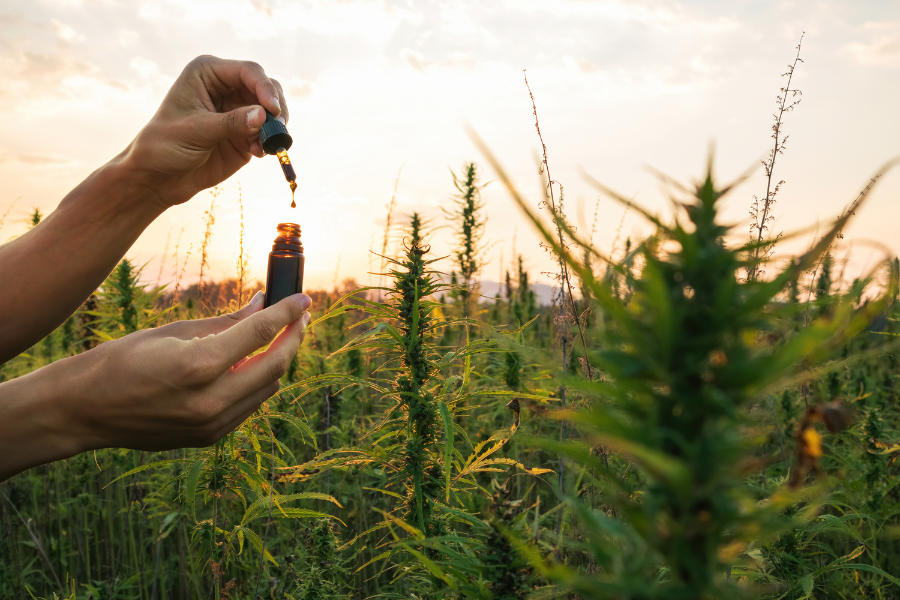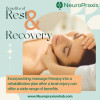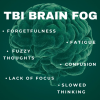Cannabidiol (CBD) is one of the chemicals (of the chemical class called cannabinoids), that is found in cannabis sativa plants such as marijuana and hemp. The two main chemicals (also known as extracts) in the marijuana plant are CBD and Tetrahydrocannabinol (THC), while hemp mostly consists of CBD. Administering CBD will not get you “high” and should not be confused with the commonly known cannabinoid THC, which produces psychoactive effects such as euphoria, resulting in feeling “high.”
Over the years CBD has become a popular topic and has been used for multiple conditions such as post-traumatic stress disorder, cancer, insomnia, mood disorders (e.g., anxiety and depression), chronic pain, and neurological conditions which includes various types of brain injuries (e.g., Traumatic Brain Injury [TBI], Strokes such as Intracerebral Hemorrhage, and chronic traumatic encephalopathy. Researchers believe using CBD may include positive effects on the brain such as neuroprotection (protecting the nervous system), anti-inflammatory, and anti-anxiety benefits.
CBD, TBI, and the Body’s Endocannabinoid System
It is believed that CBD can act on our endocannabinoid system and possibly other systems in our body which may benefit brain injuries and other neurological disorders. Our endocannabinoid system is important for body functions such as our appetite, sleep, mood, and even fertility. Research has also shown that our endocannabinoid system increases during pathogenic events (disease caused by bacteria and viruses) and plays a role in our brain’s repair and compensatory mechanisms. After experiencing a TBI, the injury may bring about harmful mediators which can create secondary damages in the brain through the release of toxic chemicals that can cause inflammation and oxidative stress. These secondary damages can lead to cell and tissue damage and create further complications in the brain.
Our endocannabinoid system consists of receptors called CB1 and CB2, enzymes (proteins), transporters, and other important components that ensure proper bodily regulation. After a brain injury, the receptors in the endocannabinoid system can be harmed. It is believed that administering CBD may help fix the damaged receptors and help signal the inflammatory cells that are important in protecting us against infections and injuries to the tissues. More research is needed on the benefits of CBD and its effects on the brain. Currently, CBD is not an approved treatment for a TBI. Before considering CBD, contact your physician to learn if it is safe and appropriate for you. The effects of CBD will also depend on the method of administrations (e.g., taking a pill), dosage, frequency and the symptoms you are trying to target (e.g., inflammation, pain, mood disorders [e.g., anxiety, depression or psychosis], insomnia, and seizures).
Listed below are facts on how CBD differs from the cannabinoid THC.
| Cannabidiol (CBD) |
|
| Making CBD-Related Terms Easier |
|
References:
Maroon, J., & Bost, J. (2018). Review of the neurological benefits of phytocannabinoids. Surgical neurology international, 9, 91. https://doi.org/10.4103/sni.sni_45_18
WebMd. (2019). CBD vs. THC: What’s the Difference? https://www.webmd.com/pain-management/cbd-thc-difference#1
Healthline. (n.d.). 7 Benefits and Uses of CBD Oil (Plus Side Effects) https://www.healthline.com/nutrition/cbd-oil-benefits#TOC_TITLE_HDR_6
Shohami, E., Cohen-Yeshurun, A., Magid, L., Algali, M., & Mechoulam, R. (2011). Endocannabinoids and traumatic brain injury. British journal of pharmacology, 163(7), 1402–1410. https://doi.org/10.1111/j.1476-5381.2011.01343.x
Russo, E. B. (2018). Cannabis Therapeutics and the Future of Neurology. Frontiers in integrative neuroscience, 12, 51. https://doi.org/10.3389/fnint.2018.00051
Rosado, J. (2019). Traumatic Brain Injury (TBI) and CBD. MarijuanaDoctors. https://www.marijuanadoctors.com/conditions/traumatic-brain-injury/cbd/
Rosado, J. (2020). Traumatic Brain Injury. Marijuana Doctors. https://www.marijuanadoctors.com/conditions/traumatic-brain-injury/
Wheless, H. (2020). Affected Athletes Are Using CBD for Traumatic Brain Injury. Remedy Review. https://www.remedyreview.com/health/cbd-for-traumatic-brain-injury



